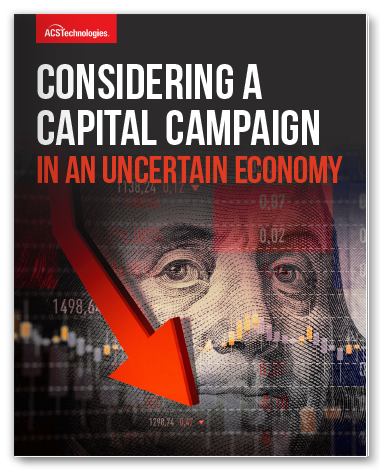Part 3 of 4
If looking at your investments or retirement fund right now gives you anxiety, rest assured you aren’t alone. Record high prices, sinking consumer confidence, and a rollercoaster stock market adds to major uncertainty about our economic futures individually and for our churches.
If your church has been exploring a capital campaign coming out of the pandemic and now find yourselves guessing about the financial impacts of the current economy, this blog series provides steps for assessing your situation. Many churches and organizations have delayed their capital campaign plans due to the uncertainty created by the pandemic and now the challenges of the economy. Many may tell you that inflation and market volatility are good reasons to stay on pause. And they might be.
In our first blog on a Campaign in an Uncertain Economy, we recommended intentionally seeking advice and counsel from members of your congregation and your major donors. In the past week’s post, we shared steps two and three, which focused on your current financial health and looking at a flexible game plan for your campaign project.
Timing is everything.
But the hard truth might be that this isn’t the right time for a campaign, even if it’s the right project. Perhaps your financial picture isn’t what it should be, and launching a campaign right now is too much of a risk to your core budget. Perhaps you don’t have the donor capacity right now for what your project cost is projected to be. Both of those issues are manageable, and we’ll unpack that here in a moment.
If, however, your explorations have led to the unmistakable conclusion that this is not the right project, that is a different matter and a very important one to have uncovered. We’ve seen too many churches launch into a campaign for a project that didn’t have enough broad support, was someone’s pet project and/or was not a missional fit for the congregation. Those failed campaigns are painful for everyone. So while this conclusion is difficult, kudos to you for arriving at it with the least amount of collateral damage to your church’s ministry, staff, budget, and reputation.
Step four is to be open to other solutions.
You need to be open if this is the right project but not the right time. As we all know, sometimes our timing is not God’s, but it’s also possible God may be calling us in another direction. We’ve seen some ministries discover new partners and innovative ways to meet the needs originally surfaced by their campaign project. For example, some faith-based organizations find a home and office space within a church rather than building or maintaining their own office facility. Those unique partnerships can be a win-win and life-giving for both organizations.
As you open the door to ways to solve challenges in ways other than a specific capital campaign, new ideas and solutions often bubble up that otherwise wouldn’t have. We’ve also seen delayed campaigns eventually find their footing in time with a renewed or new base of donor support. Be patient: Continue to meet and brainstorm ideas for your ministry.
Conclusion
As you wait, listen, and discern the next steps, focus on your church’s financial health and your donors’ relational needs. You will be prepared when the circumstances change and you find a path forward, either through a campaign or a new phase of partnership or ministry for your project.
In the final blog of this series, we’ll dive into some practical advice on how to know when to pull the trigger on a campaign and when to stay in the planning phase.
For more information on consulting for Capital Campaigns, visit ACST’s Consulting pages.
Launching a Capital Campaign in a Turbulent Economy
It can feel like record-high inflation, and stock market volatility are good reasons to keep kicking the can of a campaign launch down the road. And it’s true: Many churches and organizations have delayed their capital campaign plans due to the pandemic and now with the challenges of the economy.
But don’t give up yet. These concrete steps will help you assess how to best prepare for and launch a capital campaign for a much-needed project despite the current economic uncertainties.
Tim has over 30 years of experience in Church, Non-Profit Administration, Management, and Fund Development. Serving as an Executive Pastor and Chief Development Officer in growing Churches and Non-Profit Organizations. He has provided a wide range of expertise and resources. Tim serves as the Founder and CEO of Non-Profit DNA. A boutique firm committed to helping nonprofits and churches. By building their capacity through fundraising, leadership, team building, staff recruiting, and coaching.





